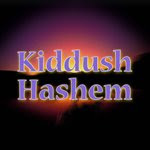
Here are the transliterations of all the songs I posted before I heard about the mac problem:
(I hope it's good- I’m not a professional transliterator…)
(“ei” is pronounced like “ay” as in “day”)-(not like “ie” as in “Liech”-unless ur chassidish-Z!)
Yodu La’Hashem Chasdo
“Yodu la’Hashem chasdo; v’nifli’osav livnei adam. Ki-hisbiyah, nefesh shokeika; v’nefesh ri’eiva, milei Tov.”
Shoshanas Yaakov
“Shoshanas Yaakov tzahala v’sameicha, bir’osam yachad t’cheiless Mordechai. T’shu’asam hayisa lanetzach, v’sikvasam b’chol dor va’dor. Le’hodiyah, shekol kovecha lo yeivoshu, v’lo yikolmu lanetzach kol hachosim buch. Arur Haman, asher bikeish l’abdi, baruch Mordechai ha’yehudi. Arura Zeresh, eishes mafchidi, b’rucha Esther ba’adi, v’gam Charvona zachur latov.”
Anachnu Ma’aminim Bnei Ma’aminim
“Yisrael be’tach ba’Hashem, ezram u’maginam hu. Anachnu ma’aminim bnei ma’aminim, v’ein lanu al mi le’hisha’ein, elah al Avinu she’bashamayim.”
V’chol Asher Ya’aseh Yatzliyach
“(Ki im be’Torahs Hashem cheftzo, ube’Torahso ye’he’ge yomam va’layla.) Ve’haya ke’eitz shasul al palgei mayim; asher piryo yi’tein bi’ito, ve’alei’hu lo yibol, ve’chol asher ya’aseh yatzliyach.”
Ben Bag Bag Omer
“Ben Bag Bag Omer: Hafoch ba va’hafoch ba, d’chola ba; uva te’chezei, ve’siv u’ve’lei ba, u’mina lo ti’zuah, she’ein lecha mida tovah hei’mena.”
Zochreini Nah
“(Vayikra Shimshon el Hashem vayomer: ‘Hashem Elokim,) Zochreini na ve’chazkeini na ach hapa’am ha’zeh, haElokim, ve’inakma nikam-achas mi’shtei ei’nye mi’pilishtim.”

 clear in his mind. [The Maharsha explains that "in his hand" refers to the chiddushim that a Torah scholar writes down. Thus, fortunate indeed is the scholar who records his Torah thoughts, for his primary learning, -and that which makes the greatest impression on him - occurs when he writes down those works. That is why Talmidei Chachamim are called Sofrim, scribes.] That’s all I can think of right now, but if anyone has anything they would like to share, please feel free to leave comments with other answers. Shkoy!
clear in his mind. [The Maharsha explains that "in his hand" refers to the chiddushim that a Torah scholar writes down. Thus, fortunate indeed is the scholar who records his Torah thoughts, for his primary learning, -and that which makes the greatest impression on him - occurs when he writes down those works. That is why Talmidei Chachamim are called Sofrim, scribes.] That’s all I can think of right now, but if anyone has anything they would like to share, please feel free to leave comments with other answers. Shkoy! 








